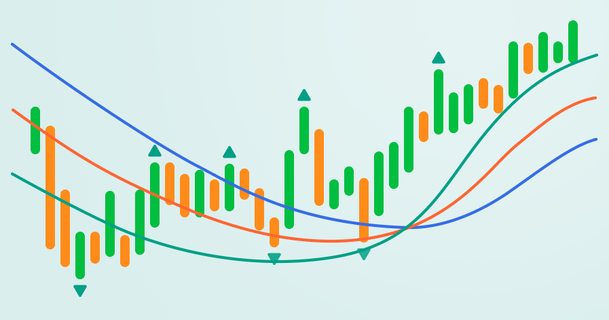
Bill Williams is the creator of some of the most popular market indicators: Awesome Oscillator, Fractals, Alligator, and Gator.

Don’t waste your time – keep track of how NFP affects the US dollar!
Data Collection Notice
We maintain a record of your data to run this website. By clicking the button, you agree to our Privacy Policy.

Beginner Forex Book
Your ultimate guide through the world of trading.
Check Your Inbox!
In our email, you will find the Forex 101 book. Just tap the button to get it!
Risk warning: ᏟᖴᎠs are complex instruments and come with a high risk of losing money rapidly due to leverage.
68.53% of retail investor accounts lose money when trading ᏟᖴᎠs with this provider.
You should consider whether you understand how ᏟᖴᎠs work and whether you can afford to take the high risk of losing your money.
2022-08-26 • Updated
Information is not investment advice
You cannot beat the system as long as you move within this system. That’s also true with the market: you cannot beat the market as long as you are conditioned by the market. And what is the main condition that the market puts on us? Practically speaking? Prices. There is nothing else, essentially. When you open your FBS Trader and see the price of any currency or stock, do you go “in fact, I find this particular quotation a bit unfair, therefore here is my offer”? No. You either take it and make your trade or leave it, postponing it to the moment when the market agrees to your offer. Why? Because there is no questioning the market. Why? Because the market knows everything, because it is so huge, because the investors, the banks, the corporations – all those who make the market, they are very intelligent with their decisions and always know what costs what.
Fair enough. So if yesterday Tesla’s share was at $900, that was correct, right? Right. If it is now at $800, that is also correct, right? Right. And what exactly happened to Tesla’s assembly plants, assets, cars, production capacities and the rest during these 24 hours that they made its share price slump by $100? Or, using a more meaningful example, what exactly happened to Tesla’s production capacities and prospects that its price rose more than 100% since December 2019? Did Elon Musk’s car land on Mars and make an alien contact? No. It’s all investors, who know everything.
But let’s not point at people and make some considerations first.
What is the Efficient Market Hypothesis? It is, basically, a mainstream trend in financial economics, which has been there since it has originated and developed around the 70-s in the US. Why would you care? Because you take for granted something that has been taught to you like an axiom: diversify, and it will deliver you from risk; take on the risk, and you will be rewarded handsomely.
Practically, from investors’ and traders’ point of view, this view proposes that when you choose an asset to operate, it doesn’t really matter what the fundamentals are about this item; more importantly, this item has to be just one out of many. In other words, no need to read, no need to study, just pick out as many trading instruments as you can, and you will stay on the safe side. Also, this approach leads to neglecting fundamental analysis and shifting more to technical analysis – since all your items may be now nameless and present a faceless minor percentage in your portfolio. Therefore, all you have to do is to deal with price fluctuation when looking at any given asset.
Also, it simplifies and “digitalizes” your choice: you either avoid risk and thereby trade items with a lower magnitude of price fluctuation earning less profit, or you take on risk and go for assets with high-magnitude price fluctuation earning more. Therefore, it is 0 or 1.
For you, as a trader, this hypothesis offers some like this: go technical, forget fundamentals, just decide how much you want to earn. Of course, you go “I want as much as possible”. Hence, you go for the riskiest currency pairs and stocks. And earn… you know better how much you earn. But would you like to know what Warren Buffet thinks about all this? You better should.
In case you haven’t heard of Warren Buffet, here is a short “inside” information on him: he is an investor, he is almost 90 years old, and he is the fourth wealthiest person in the world. So you choose whether his profession, age or success motivates you most to listen to his opinion.
In his “Essays” (1997), he describes investment approaches that he practiced along with his partner and CEO at Berkshire Hathaway Charlie Munger. Among those, he writes a separate chapter on the Efficient Market Theory, naming it “Debunking Standard Dogma”. Mainly, he says that this theory became fashionable in economic academic circles in the said 70-s. The stunning part, he continues, is that no one really cared to officially disprove it later, even having lots of facts, statistical data, and experiences showing that the EMH is just not true (or at least not always true). Eventually, he argues, it became a widespread misconception about the market that no one questions just because it has been there so long and so everywhere. As a result, it remains one of the major theories that define how traders approach the market.

In a nutshell, Warren Buffet recommends relying on a thorough study. Read the fundamentals, learn the inner working of the asset you choose. Get to know everything you can about the thing you want to buy to make sure you are comfortable with the level of your knowledge about it so you truly believe that you are making a meaningful investment. How to know that a company will be successful or currency will be growing in the future? Again: study, read, observe, and use common sense raising due questions, such as “What do customers like?”, “What makes a strong economy?”, “What makes this asset demanded?” etc. He suggests any trader or investor choose a limited number of items, just several assets, which he/she believes would really do well in the future, and put money into them. No diversification, no “eggs in different baskets”. On the contrary, his approach suggests fundamental study and asset concentration, instead of technical study and diversification. There is very much to his way of thinking. Don’t believe me – believe Warren Buffet.
When you have 10 shares, you think, “If one drops, I don’t lose too much; it’s just 1 out of 10”. When you have 100 shares, you think, “It’s even better; if one drops, it’s just 1 out of 100”. That makes sense. But what if all of them drop, say, in a recession? You would say “I go with the market; it goes down – I go down too”. Fair enough, but what do you prefer: being safe or sorry? Would you disperse all your investments across the entire market and eventually go down with the market when the hard times come? Or, you would prefer a bulk of selected resilient assets in your hands, able to withstand any blow of “outrageous fortune”? If the latter attracts you more, then you need to choose a different common sense approach. Instead of putting your eggs in different baskets, you have to look for one or a few reliable ones and carry your eggs in there. This means, instead of shooting in all directions to feel safe and eventually sink with the ship when the storm comes, you have to be selective and certain about why you choose this item or that one and put your confidence in it once you have made your research. In the end, that item may be one of those few which keep standing when the market goes down. And it is very possible: for example, the stock market has been through a lot during the last 100 years, but there are companies which survived through all these years and almost never left the rising curve. With this, your objective is to identify those companies. You will say “but that takes so much time and gives no guarantee!”. Exactly. This is the market, there are no guarantees. There are just choices, options, alternatives. All have a grain of truth to them, you just need to choose one that serves you better.
Efficient Market Hypothesis suggests you put the fundamentals aside. Instead, it pushes you to spread your investments as much as you can and consider price fluctuation magnitude for each asset as the only relevant factor that eventually contributes to your profit.
Warren Buffet, on the contrary, suggest you disregard the raw technical analysis. He advises you to hold a narrow selection of assets, which you strongly believe have all the fundamentals (which you have thoroughly studied) to stand tall at all times and keep growing.
The difference between the two is very much like the difference between a sniper and a regular foot soldier, explained by Tom Berenger in “Sniper” (1993): “Their idea of combat is tearing up the countryside… with millions of rounds. We’ll wait days for one shot”.
Probably, you got the idea: you blindly toss the cards betting that statistics beat your losses, or you study something well and then bet your money that you have indeed studied it well. In the end, it probably comes down to trusting yourself.

Bill Williams is the creator of some of the most popular market indicators: Awesome Oscillator, Fractals, Alligator, and Gator.

Trend strategies are good - they may give significantly good results in any time frame and with any assets. The main idea of the ADX Trend-Based strategy is to try to catch the beginning of the trend.

Counter-trend strategies are always the most dangerous but also the most profitable. We are pleased to present an excellent counter-trend strategy for working in any market and with any assets.
Your request is accepted.
We will call you at the time interval that you chose
Next callback request for this phone number will be available in 00:30:00
If you have an urgent issue please contact us via
Live chat
Internal error. Please try again later